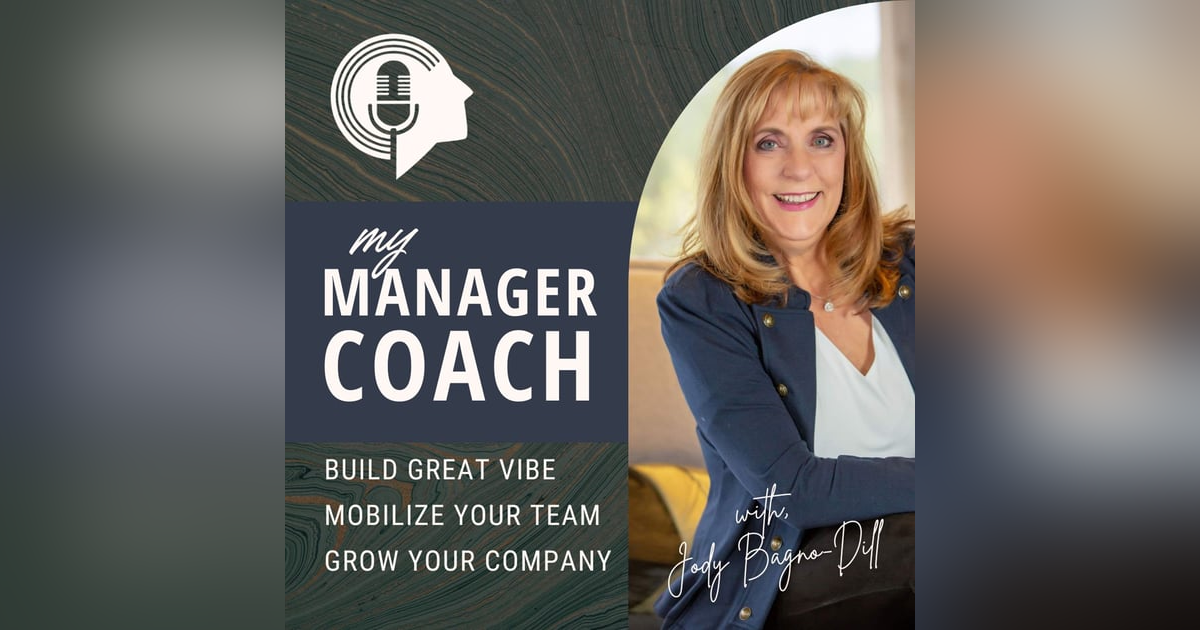Core Values: Your Culture's First Line of Defense Against Opportunists

In this episode of My Manager Coach, Jody unpacks the strategic power of core values—not just as feel-good slogans but as vital tools to protect your culture, clarify expectations, and filter out opportunists.
Drawing from real-life stories (including Netflix, CD &Power, and WR Properties), Jody explains how strong values create behavioral boundaries, guide hiring and promotions, and insulate your organization from cultural drift, dysfunction, and even legal risk. If you lead people and want to build a values-driven culture that scales, this is a must-listen.
Topics covered:
- Why opportunists thrive in ambiguity
- Stories of companies who live their values (and win)
- How many is too many when it comes to defining your core values
- Using values to drive hiring, discipline & recognition
- The hidden legal and cultural risks of value drift
For more information and help JazzBC.com
To register for FREE upcoming webinars tailored for Managers: Click Here
Jody Bagno-Dill: When a company's core values are clear and actually lived out, they serve as both a rally cry for top performers and a warning label for those looking to game your system.
Opportunists thrive in ambiguity, but when values are visible and non negotiable, they draw a line in the sand. And today we're diving into how core values don't just mobilize your team, but they protect your culture from opportunists,
from drift, and from dysfunction.
Welcome to My Manager Coach the podcast to help you fix what's not working at work.
I'm Jodi Bagno-Dill your executive coach and growth strategist.
Each episode you'll learn strategies to mobilize your team, build great vibe, grow your organization,and love coming to work again.
Let me share with you a real world story of a company we all know and love.
In the early 2000s, Netflix was scaling rapidly and needed to ensure that its culture could withstand the pressures of growth.
Instead of just posting platitudes, CEO Reed Hastings codified Netflix's core values and what became a famous internal document called the Netflix Culture Deck. It emphasized the values like respect,
courage, curiosity, and impact.
But what set Netflix apart was how seriously they took living those values.
At one point, a senior executive was delivering results but violating the company's value of respect through his toxic behavior and politicking.
Despite the performance,
he was let go. The decision sent a strong message. You cannot outperform your way out of a values violation.
And this clarity did two things.
The top talent leaned in because they felt safer and more inspired to collaborate,
and the opportunists opted out.
They realized they couldn't manipulate their way into power.
Netflix didn't just post their values. They actually made them a filter for who belongs, for how decisions are made,
and for defining what success looks like.
My challenge to you is if I walked around your company and asked your employees what the three top core values are,
would they answer the question the same way you would?
Today, I want to talk about how to leverage the core values of your company,
because it's how everyone is making decisions about their work. See, you don't build a great company with policies. You build it with action and principles, those unspoken things that are understood by everyone.
Core values are like banks to a river. They keep momentum and flow going in a good direction.
Companies that don't really utilize core values, it's like a river without banks. The momentum just goes everywhere. It's not focused and it's not powerful.
So core values level the playing field and they define Behavioral boundaries. But first, let me share with you really what's at stake besides a drift to your momentum.
What's at stake is it makes you vulnerable to lawsuits, it makes you vulnerable to opportunists to not adhere to a commitment to core values.
Phone calls every week.
And it always, the answer is almost always core values. When I get questions about how to address certain things,
whether it's a question about why not to hire somebody,
or a question about promoting an employee,
or a question about disciplining or developing an employee,
the answer is always bring it back to core values. Now, what core values are, let me give you our definition, because it's one of those phrases that's used a whole bunch in writing and teaching and everybody kind of has a different take on it.
So let me share with you what I mean by core values. Now, core values define the culture of your organization when everybody is operating at their very best.
Core values are not aspirational.
Rather, they are a result of discovering what those three special words are that define your organizational culture.
When everybody's firing on all cylinders and the machine is moving. Well,
if you were to bring in a new employee on their first day of work, one thing that every new employee wants to know is what does it take to fit in around here and what does it take to thrive?
If you were to answer that question with three words, if you just embody these three characteristics, these three adjectives, you'll fit in well, you'll thrive, and you'll be successful here, what would those three words be?
Now, we've taken a lot of companies through this process and it has been powerful to define and articulate these core values. I give a ton of credit to Patrick Lencioni, who invited us into a two day talk in his process several years ago and he was the first one that explained core values this way.
He is a master when it comes to teaching about core values.
But let me share with you how we have used that value. Please note that a lack of one or more of the core values on the part of one of your employees means they're going to be a problem employee.
The ones that you are struggling with the most are probably violating what your actual core values are. And that's why they're a problem now when there's employee lawsuits.
And let's face it, one of the things that we all fear is an opportunist among our tribe. And,
and so we want to be able to spot those opportunists before they ever infiltrate our organizations.
But when an opportunist comes in. What they do is they look for weak operational gaps and they exploit them.
They never come in wearing a name badge that says opportunist. They come in usually looking like a really great employee. They may not even know they're opportunists. But having done this for 20 years and having seen some lawsuits and seeing what works and what doesn't out there, core values a secret weapon to insulate and protect your company,
your organization, and your staff.
When a lawsuit happens, one of the questions a judge will ask is, was this expectation evenly applied to everyone in the organization?
Was this expectation communicated equally to everyone in the organization? They want to make sure that you're not singling out somebody in your organization.
Now, people can't remember more than three.
So if you have more than three core values, you are watering down their ability to remember them and also to apply them to decision making.
Because core values should be the foundation for how people make decisions about their day, about their work, about their interactions with their co workers and their bosses and their direct reports.
Pat Lencioni tells us that core values are your behavioral boundaries. When you have these, you hire according to them, and it will ensure that this person has a higher chance of being a good cultural fit.
You train them,
you teach people how to make decisions and prioritize using core values. You reward for them. You catch people living out their core values and doing it right,
and you hold them up for everybody to see and say,
this is what it means to live out this core value.
And you show people this is what gets you attention. This is what gets you consideration for a promotion or a special project.
You can use them for development and discipline. A a violation of a core value that's equally applied as an expectation to everybody is reasonable, and it's tough to argue with because it's something that we are all,
as part of this company, called to live up to. You use them for consideration for a promotion into higher levels of management,
especially into senior levels of management and certainly on your board of directors, if you're a company that has a board of directors.
Core values are just that. They are core to everything you do. Let me give you some examples of some companies who have really leveraged core values well, and I'm so proud of them.
Most of these companies I'm going to share with you have been doing this for many years,
and they have all experienced enormous growth as a result of good strategy and leveraging core values.
So one of my companies actually was my very first paying client almost 20 years ago.
They were a small commercial generator company. Now they've grown to a main player in the space in Northern California.
Their core values are positive, honest,
and dedicated.
Now, while those might seem like benign, common words,
each company chooses how they define what each of those core values mean in terms of action.
So at this company,
positive means we believe that there's a solution to every problem and we don't quit until we find what it is. Honest to them is defined as we do the right thing even when no one's looking.
And if we make a mistake, we are forthright and transparent about it and we take ownership of that mistake and commit to making it better.
Is we have each other's back and we show up until the job is done.
Well, those are their three core values, and they've been so helpful to this company. This leader who's one of the greatest leaders I've ever worked with, Lisa Carter, shout out to CD & Power in Northern California.
She brings all of our field technicians in for one day of training. Do you have any idea how expensive it is to bring almost a hundred people in from the field for a day of training, supporting, and equipping?
But she knows it's had a huge payoff. So first thing in the morning,
she brings everybody into the same room. They do a staff meeting. They have announcements and updates, and they have celebrations of things,
different milestones that they achieve. They really have built this culture of celebration.
And one of the things they celebrate is, is people living out the core values.
So people would write down on a piece of paper, they would nominate each other for being positive, honest, or dedicated.
And they would read that piece of paper in front of everybody. Hey, I just wanted to thank Dan for being dedicated. We had to switch out a generator at three in the morning in a remote place in the mountains.
And he was there with me, and we laughed and he never complained, and he just really helped us do a good job.
They catch what people do right and they celebrate it. It just so happens that their core values, positive, honest, dedicated, spell out PhD. When they first started this,
they came up with this process that if you got nominated 25 times for core values, you earned your PhD and you got a special jacket with a patch that said PhD on it.
One time years ago, in the very beginning,
they had two gals that no longer work there. So I can tell this story that took time off work because their boss was gone and they went into the bathroom and colored each other's hair on company time.
So when the boss found out about it and Came back,
how do you correct that? Normally you would say, what are you thinking? That's not what you do at this company. But he was able to tie it to core values.
He said, what about that is honest and what about that is dedicated?
Can't really take that personally because it's core value everybody lives up to. There is a phenomenal real estate company in the San Francisco Bay area called WR Properties. They communicate their core values so well.
Their core values are accountability,
coachability and ethical. And they had to choose ethical because in the real estate world,
that's not always a given. Apparently theirs spell out the word ace. And so everything that they communicate is done around this theme of being an ace. If you follow them on social media, you'll see weekly celebrations of who lives out being an ace.
And as a result, they are a fast growing real estate organization. They're so good at their core values and they don't bring on just any real estate agent that wants to hang their license there.
You have to prove that you're an ace before you get hired. Another organization that I love, their Stormwater Management company,
another company in the trades. This is really good for companies in the trades.
Their core values are passionate, accountable and team player. And they have certain definitions for those. And so when they nominate each other to catch each other living these out, it's called a pat.
Passionate, accountable,
team player, a pat on the back.
And they define their culture that way.
They just sold to a larger company for an incredibly high multiple. Our core values at our company are these three core values. Connection.
We're connected with people. We care deeply. We like people, we like working with people,
passionate about what we do and about the difference it can make.
And results oriented.
It doesn't matter what we teach or what we coach if we don't help clients actually achieve their end results.
For 20 years we've been giving CPR to companies who want to grow and who are struggling with their culture. So remember, these core values are a process of discovery. What already exists, how you would define what your culture looks like.
Now if you need help with this, what we have a team assessment that is coming out. It's going to be part of a package. Plan your own strategic planning retreat and we will ask you the questions in a preliminary way that gives you the information so you can have a great discussion about core values.
If you're interested in more information about this, shoot us an email. We would be happy to help you with this. Remember, core values define the culture of your organization. When you are operating at your very best core values cover you in legal vulnerabilities.
Now, again, I always say I'm not a lawyer. Check with your employment lawyer as to how to apply this teaching in your state, because states differ.
And three core values give you the very foundation you need to create a culture of celebration.
Not one that celebrates birthdays and anniversaries, but celebrates the good work of of the good people.
So my challenge to you today is to ask a handful of employees what they believe the top three core values are for your organization.
It will give you great insight as to how they are making decisions.
Okay, that's it for today. Thanks for sticking with me. Go make the world a better place and build great vibe. Thank you, my friends.



